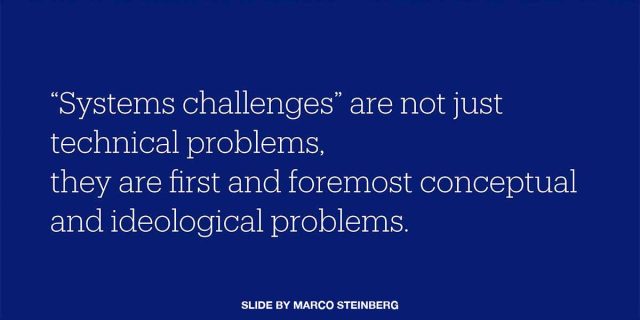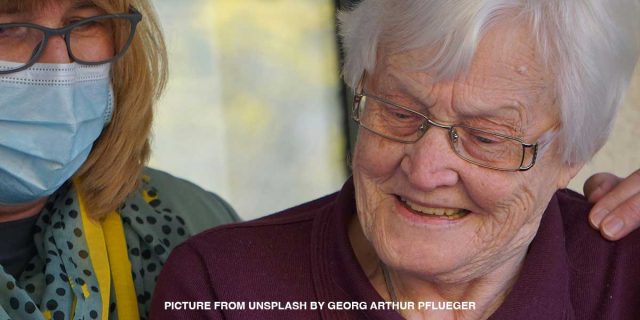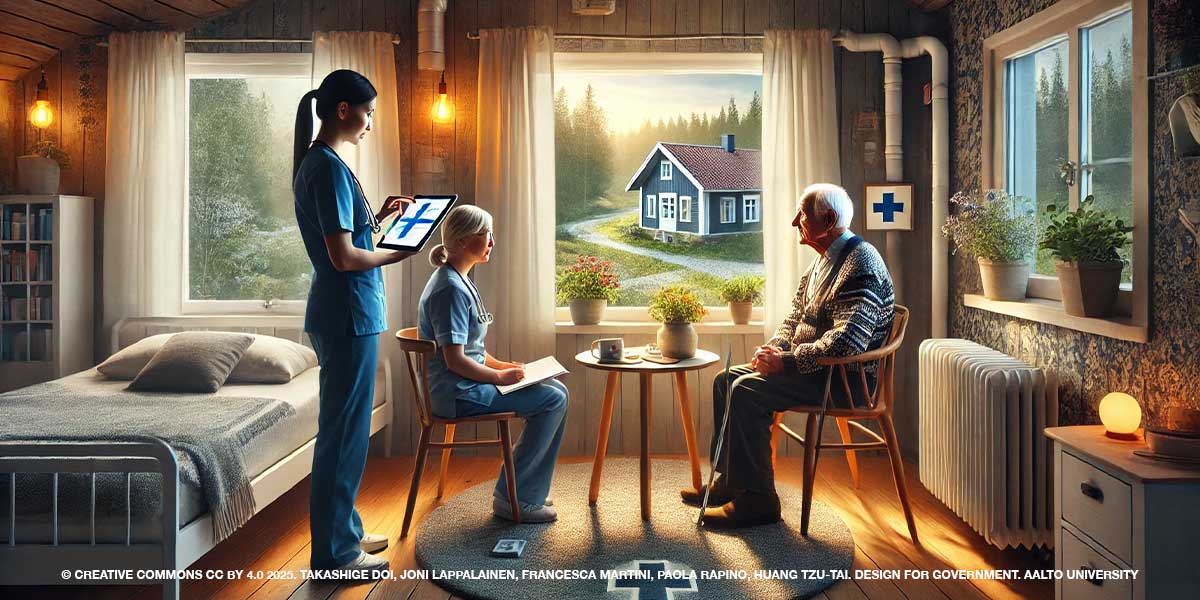This blog post reports on work-in-progress within the DfG course! The post is written by group 1 dealing with Kela, the Social Insurance Institution of Finland’s brief on ‘Continuity of Knowledge’ in healthcare reform. The group includes Takashige Doi from Collaborative and Industrial Design program (Aalto University), Joni Lappalainen from Collaborative and Industrial Design program (Aalto University), Francesca Martini from Creative Sustainability (Aalto University), Paola Rapino from Creative Sustainability (Aalto University, exchange) and Huang Tzu-Tai from Sustainable Entrepreneurship (Aalto)
Written by: Paola Rapino
Over the last three weeks, we started setting a more precise direction for the project. After our initial research, divided into topic-specific workstreams, we were merged into groups of five people. Being finally able to join our different perspectives, we started reconstructing a more complete picture of Continuity of Knowledge for the population aged 65 and beyond in Finland.
The complexity of the Finnish care system started emerging pretty soon in the process. We had already discussed the issue in the previous weeks; however, merging our research brought us to a new level of awareness. Despite focusing on just a portion of the Finnish welfare, we realized the intricacy of the connections that come together to deliver all the care-related services for our target group.
We therefore started wondering: in this intertwined system, how can one not lose sight of the final user? How could one ensure that the individual remains the proper focus of care? and doesn’t get mistaken or replaced by numbers or metrics? Being tasked to work on the system of care for humans, we realized how the current approach to improving care services lies in implementing digital tools, such as Kanta, though inevitably undermining the human factor. The infrastructure for capturing data and information is strong, but what is the next step? How is data integrated into the care system to generate knowledge–such as actionable insights that can inform better care practices and patient outcomes?
This is the challenge we’ve taken on.

Figure 1: Slide from “Introduction to systems design” presentation shared in class.
From Systems to People: Redefining Elderly Care
Reflecting on what was also discussed in class, “System challenges are not just technical problems, they are first and foremost conceptual and ideological problems”. In other words, the systems we live in are generated by humans, and so are the barriers within them. Excessive reliance on digital infrastructures is not inevitable—it’s the outcome of choices and governance models.
It’s then time to change perspective on the topic and leverage the efforts made so far to elevate the care system for Finland’s elderly population. How? This could begin with improved coordination and sharing of patients’ information within and across the realms of health and social care. One of the most significant gaps in Finland’s welfare system is that healthcare and social care often function as separate silos (Keskimäki et al., 2019). Despite policy efforts to improve integration, such as the Finnish health and social care reforms, gaps in coordination persist, leaving many older adults navigating a system that struggles to provide seamless, person-centered care (Tynkkynen et al., 2022).
Digital tools like Kanta effectively store medical data, however, there’s a struggle in integrating aspects such as social determinants of health, as they don’t fit in a metrics-oriented system. This kind of information is necessary to build the full picture of one’s living conditions, leading otherwise to partial and fragmented care. Collecting a high quantity of data does not necessarily translate into meaningful knowledge for decision-making or for the people receiving care. On the contrary, this can lead to the opposite direction, in which too much information becomes a bureaucratic burden rather than a tool for improving care. Continuity of knowledge is about ensuring that medical, social and personal wellbeing information is not just stored, but shared, interpreted and transformed into actionable insights.

Figure 2. Photo of an elderly person receiving home care (Georg Arthur Pflueger from Unsplash, 2020).
The Impact of Social Care
The urgency of addressing gaps in continuity of knowledge is highlighted by Finland’s rapidly ageing population trend. By 2030, more than 25% of the overall population is expected to be 65 or older, and this proportion is expected to rise by 2050 (Ministry of Social Affairs; Association of Finnish Local and Regional Authorities, 2020). Given the increasing reliance on the care system, especially the public one, this demographic shift puts a lot of pressure on the country.
Research shows how early interventions can significantly reduce hospital admissions and long-term care dependency, making prevention a key concept in this scenario (Ministry of Social Affairs and Health and Association of Finnish Local and Regional Authorities, 2020). At the same time, most elderly people express a strong preference for ageing at home, as opposed to institutionalized care facilities (THL, 2023). Given these conditions, as a group, we decided to focus our research on social care, emphasizing the social aspects of ageing. It’s not just a biological process; it is a profoundly social experience, shaped by one’s living environment, relationships, and community support.
To meet the preferences of the “target population” in the current context it’s necessary to step up the current coordination across different realms of care, with the aim of supporting older individuals maintain their independence.
In particular, home care services can greatly enhance an individual’s ability to remain active and engaged in their communities, ultimately promoting both mental and physical health. Such interventions rely heavily on effective knowledge-sharing between different care actors, enhancing the role of social care and social workers—something that remains an ongoing challenge in Finland’s current system. If information about a person’s daily functional capacity is not consistently communicated, opportunities for early intervention may be missed.
Conclusion
As our research progresses, one thing remains clear: continuity of knowledge is not just a technical challenge—it is a human-centered challenge. It is not enough to collect and store information; what matters is how that information is shared, interpreted, and applied to improve real-life outcomes for older adults. Finland is at a crossroads where digital solutions must evolve to support not only institutional efficiency but also the fundamental right to age as independently as possible. Moving forward, integrating medical and social care data could help bridge gaps across care sectors, ultimately fostering collaboration.
With a rapidly ageing population, the time for incremental change has passed. If Finland wants to uphold its commitment to a human-centered welfare model, then ensuring continuity of knowledge must become a national priority—not just in policy discussions but in everyday care practices.
References
Keskimäki, I., Tynkkynen, L.-K., Reissell, E., Koivusalo, M., Syrjä, V., Vuorenkoski, L., Rechel, B., & Karanikolos, M. (2019). Health System Review 2019. 21(2). https://iris.who.int/bitstream/handle/10665/327538/HiT-21-2-2019-eng.pdf?sequence=7
Ministry of Social Affairs and Health and Association of Finnish Local and Regional Authorities. (2020). Quality recommendation to guarantee a good quality of life and improved services for older persons 2020–2023. The Aim is an Age-friendly Finland. https://julkaisut.valtioneuvosto.fi/bitstream/handle/10024/162595/STM_2020_37_J.pdf?sequence=1&isAllowed=y
Home care—THL. (2023, December 5). Finnish Institute for Health and Welfare (THL), Finland. https://thl.fi/en/topics/ageing/older-people-services-undergoing-a-change/home-care
Tynkkynen, L.-K., Pulkki, J., Tervonen-Gonçalves, L., Schön, P., Burström, B., & Keskimäki, I. (2022). Health system reforms and the needs of the ageing population—An analysis of recent policy paths and reform trends in Finland and Sweden. European Journal of Ageing, 19(2), 221–232. https://doi.org/10.1007/s10433-022-00699-x
The DfG course runs for 14 weeks each spring – the 2025 course has now started and runs from 24th Feb to 27th May. It’s an advanced studio course in which students work in multidisciplinary teams to address project briefs commissioned by governmental ministries in Finland. The course proceeds through the spring as a series of teaching modules in which various research and design methods are applied to address the project briefs. Blog posts are written by student groups, in which they share news, experiences and insights from within the course activities and their project development. More information here about the DfG 2025 project briefs. Hold the date for the public finale on Tuesday 27th May!

